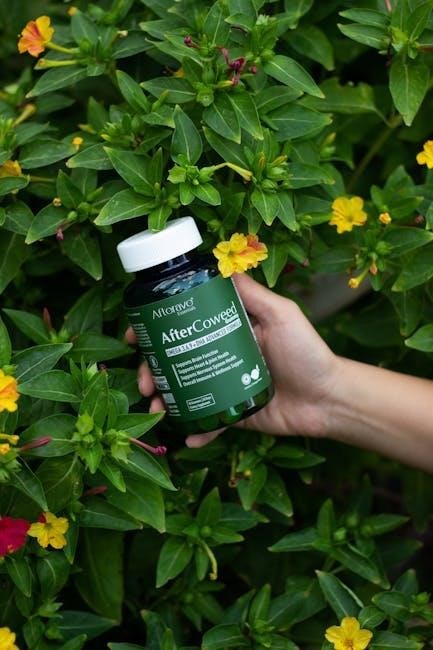
Gut health is the foundation of overall well-being, influencing digestion, immunity, and even mental clarity. A balanced gut microbiome supports nutrient absorption, metabolism, and disease prevention, making it essential for holistic health.
The Importance of the Gut in Overall Health
The gut is crucial for overall health, primarily through its role in digestion and nutrient absorption. It ensures the body receives essential nutrients for optimal functioning. The gut also houses a significant portion of the immune system, protecting against pathogens and maintaining immunity. Furthermore, the gut-brain axis links the gut to the central nervous system, influencing mental health and emotional well-being. Dysbiosis, an imbalance in gut bacteria, can lead to digestive disorders, weakened immunity, and mental health issues like anxiety and depression. Additionally, the gut produces neurotransmitters that affect mood and cognitive function. Maintaining gut health is vital for preventing these conditions and promoting overall well-being. A balanced gut microbiome is essential for sustaining bodily functions and preventing a range of health issues.
Understanding the Gut Microbiome
The gut microbiome is a complex community of microorganisms in the digestive tract, mainly in the large intestine. It plays a crucial role in health by aiding digestion, boosting immunity, and producing essential nutrients. A balanced microbiome supports nutrient absorption, immune function, and hormone production, influencing mood and appetite. Dysbiosis can lead to digestive disorders, autoimmune diseases, and mental health issues. Maintaining balance through holistic practices is vital for preventing these conditions and promoting overall well-being. A healthy microbiome is essential for sustaining bodily functions and preventing various health problems.
Diet and Nutrition for Gut Health
A holistic diet focuses on nutrient-rich foods like leafy greens, fermented foods, and whole grains to support gut health. Probiotics and prebiotics are key for microbiome balance.
The Role of Elimination Diets in Identifying Food Sensitivities
Elimination diets are a powerful tool for identifying food sensitivities by removing common triggers like gluten, dairy, soy, and processed foods for a period of time. After an elimination phase, foods are reintroduced one at a time to monitor reactions. This approach helps pinpoint specific foods causing inflammation, digestive issues, or other symptoms. By focusing on whole, nutrient-dense foods, elimination diets promote healing and reduce inflammation in the gut. They are often recommended as a first step in functional medicine to create a personalized diet plan. However, consistency and patience are key, as the process can take several weeks. Professional guidance is highly recommended to ensure proper implementation and avoid nutrient deficiencies.
Best Foods for Gut Health: Leafy Greens, Fermented Foods, and More
Leafy greens like spinach and kale are rich in fiber, which feeds beneficial gut bacteria, promoting a healthy microbiome. Fermented foods such as sauerkraut and kimchi contain probiotics, aiding digestion and boosting immunity. Other gut-friendly options include bone broth, which heals the gut lining, and omega-3 rich foods like salmon, reducing inflammation. Incorporating these foods into your diet supports overall digestive health and well-being. A balanced gut promotes better nutrient absorption and a stronger immune system, essential for holistic health.
How to Incorporate Probiotics and Prebiotics into Your Diet
Incorporating probiotics and prebiotics into your diet is essential for gut health. Probiotics are live bacteria found in fermented foods like yogurt, kefir, sauerkraut, and kimchi, which support gut flora balance. Prebiotics, non-digestible fibers, feed beneficial bacteria, promoting their growth. Garlic, onions, asparagus, and bananas are excellent prebiotic sources. Start by adding small portions of these foods to meals to avoid digestive discomfort. Gradually increase intake as your gut adapts. Pairing probiotics with prebiotics creates a symbiotic effect, enhancing gut health benefits. Consider supplements if dietary sources are insufficient. A balanced intake of both supports digestion, immunity, and overall well-being, fostering a thriving gut microbiome. This holistic approach ensures long-term digestive harmony and vitality.

Lifestyle Factors Impacting Gut Health
Stress and physical activity significantly impact gut health. Chronic stress disrupts the gut-brain axis, while regular exercise enhances digestion and reduces inflammation, supporting overall well-being.
The Impact of Stress on the Gut-Brain Axis

Stress disrupts the gut-brain axis, a bidirectional communication network between the central nervous system and the gut. Chronic stress triggers inflammation, impairs digestion, and alters gut microbiota, leading to issues like bloating and Irritable Bowel Syndrome (IBS). The gut microbiome produces neurotransmitters like serotonin and dopamine, which regulate mood and mental health. When stressed, the body releases cortisol, weakening the gut lining and causing “leaky gut,” where toxins enter the bloodstream. This can result in systemic inflammation, further exacerbating mental health conditions like anxiety and depression. Managing stress through mindfulness, yoga, and relaxation techniques is crucial for maintaining gut health and overall well-being;

Physical Activity and Its Role in Digestive Health
Regular physical activity plays a vital role in maintaining digestive health by enhancing gut motility, improving nutrient absorption, and reducing symptoms of digestive disorders like IBS. Exercise stimulates the muscles in the intestines, promoting the movement of food through the digestive tract and preventing constipation. Physical activity also increases blood flow to the gut, supporting the repair and function of intestinal cells. Additionally, moderate-intensity exercises, such as walking or cycling, can reduce inflammation and improve the balance of gut microbiota. However, excessive exercise without adequate recovery may stress the body, negatively impacting gut health. Balancing physical activity with rest is key to optimizing digestive function and overall well-being.

Holistic Therapies for Gut Healing
Holistic therapies focus on restoring gut balance through natural methods like functional medicine, herbal remedies, and mind-body practices, promoting long-term healing and overall wellness.
Functional Medicine Approaches to Gut Health
Functional medicine offers a personalized approach to gut health by identifying root causes of imbalance, such as diet, stress, or infections. Practitioners use tailored interventions, including elimination diets, probiotics, and supplements like L-glutamine, to repair the gut lining and restore microbial balance. They also consider lifestyle factors, such as physical activity and mental health, to address the gut-brain axis. This holistic strategy aims to enhance digestion, reduce inflammation, and improve overall well-being. By addressing each individual’s unique needs, functional medicine provides a comprehensive path toward optimal gut health and long-term wellness.
Supplements for Gut Repair: L-Glutamine and More
L-Glutamine is a key supplement for gut repair, as it helps heal the intestinal lining and reduces leaky gut syndrome. This amino acid supports the gut barrier, improving nutrient absorption and reducing inflammation. Probiotics are another essential supplement, balancing gut bacteria and enhancing digestion. Omega-3 fatty acids, particularly EPA and DHA, reduce inflammation and promote gut integrity. Additionally, digestive enzymes aid in breaking down food, easing digestive discomfort. These supplements, when used appropriately, can restore gut health and support overall well-being. Always consult a healthcare professional before starting any new supplement regimen to ensure personalized benefits and safety.
A healthy gut is vital for overall well-being. By incorporating holistic practices, balanced nutrition, and targeted supplements, you can achieve optimal gut health. Explore recommended resources and books for further guidance on gut wellness and holistic healing.
Final Tips for Maintaining a Healthy Gut
To maintain a healthy gut, focus on a balanced diet rich in fiber, leafy greens, and fermented foods. Stay hydrated and manage stress through meditation or yoga. Incorporate probiotics and supplements like L-glutamine to support gut repair. Avoid processed foods and consider periodic elimination diets to identify sensitivities. Regular physical activity promotes digestive health, while adequate sleep aids gut restoration. Listen to your body and adapt your lifestyle to nurture your gut microbiome. For chronic issues, consult a healthcare professional to tailor a holistic approach. Consistency and patience are key to achieving and maintaining optimal gut health.
Recommended Reading and Resources for Further Exploration
For a deeper understanding of gut health, explore resources like The Holistic Guide to Gut Health and Dr. Nandi’s comprehensive guides on nutrition and supplements. The Cleveland Clinic and functional medicine experts offer valuable insights into gut microbiome balance. Listen to podcasts like Nutrition Essentials for expert discussions on food and gut health. Additionally, research publications and books on critical thinking can enhance your ability to evaluate gut health strategies. Online communities and forums where individuals share holistic healing journeys provide practical tips and inspiration. Always consult reputable sources and healthcare professionals before starting new protocols. These resources empower you to make informed decisions for your gut and overall well-being.




